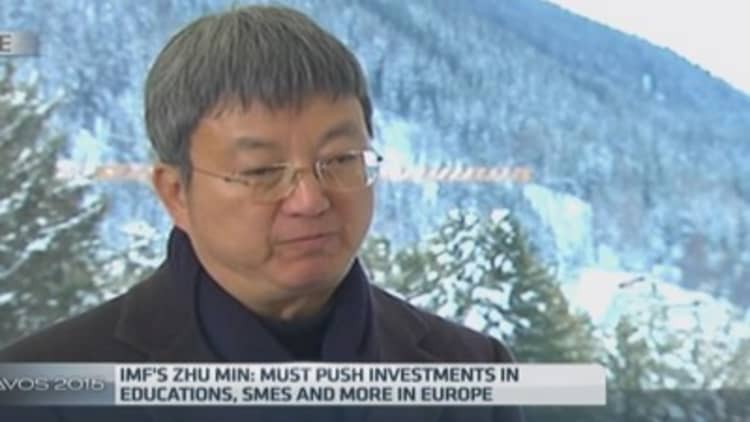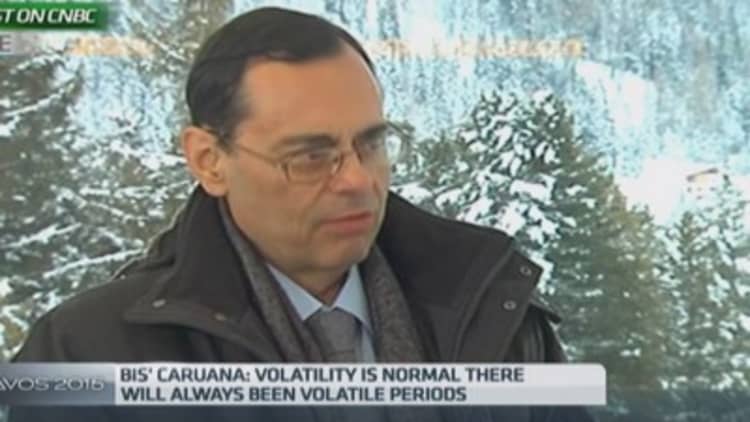
Structural reform: some of Europe's politicians might have hoped never to hear those words again following bold monetary stimulus from the European Central Bank (ECB). But they'll have to think again.
The ECB on Thursday unleashed an asset-purchase program worth 60 billion euros ($70 billion) a month in a bid to tackle deflation and weak growth in the 19-member euro area head on.
This long-awaited monetary boost throws the ball back in the court of euro zone politicians to do their part to lift growth prospects, according to experts gathered in Davos, Switzerland this week for the World Economic Forum.
"One thing is clear, the ECB's decision shouldn't take the politicians off the hook, they should still do what's necessary," Jeroen Dijsselbloem, head of the euro zone finance ministers' forum the Eurogroup, told CNBC Thursday.
"Politicians should get on with dealing with their economies, opening up their markets and making labor markets more flexible – these are all the things we call structural reform," he added.
Analysts say a slow response by governments to implement long-term reforms in areas such as making it easier to hire and fire, investment and spending programs help explain why Europe has struggled to recover from the global financial crisis.
Read MoreLagarde on European QE: It's already working
The International Monetary Fund (IMF) this week revised down its forecast for euro zone economic growth to 1.2 percent in 2015 from a previous estimate of 1.3 percent. Compare that with the U.S., which the IMF forecasts to grow 3.6 percent this year.
Invest!
"We should not over emphasize money (monetary stimulus). It's not the only game in town. Really investment and structural reform are the main games in town and we need the money (stimulus) to create space for these things," said Zhu Min, deputy managing director at the IMF.
"If you compare today's euro area investment levels with 2007, in terms of GDP (gross domestic product) this fell 5 percent. This is a huge number, how can you lose 5 percent of investments that would lead to strong growth? So I think the priority is to push investment not just in infrastructure but areas such as also the knowledge economy as we see in Germany," he added.
At Thursday's ECB news conference, central bank President Mario Draghi said "speed is of the essence" in implementing a 315 billion euro investment plan unveiled by the European Commission late last year.
Draghi also stressed the need for structural reforms to "encourage investment."
Time to act

Jaime Caruana, General Manager at the Bank for International Settlements, told CNBC in Davos that monetary stimulus by the ECB needed to be complemented by reforms.
"The most important thing when we take a long-term perspective is that this (ECB stimulus) should be an incentive to do more reform in Europe and then there is a possibility that Europe starts to grow again," he said, adding weak oil prices also provide a favorable back drop for reforms.
In addition to last year's 50 percent tumble in oil prices, the euro is down about 14 percent in the past six months – providing euro zone exporters with a competitive edge abroad.
Others attending the WEF in Davos pointed to the progress some countries have made in restructuring their economies.
"(In Italy), labor reform is good and banking reform is going in the right direction," said Generali CIO Nikhil Srinivasan
"People who are skeptics of QE (quantitative easing) that say if there is QE there is no reform are wrong. If you want to create jobs in the euro zone you have to have reform. The Spanish have done it for the last two years and the jobless rate is falling," he added.
Spain's unemployment rate is still very high at just under 24 percent, but that is down from almost 27 percent in 2013.





